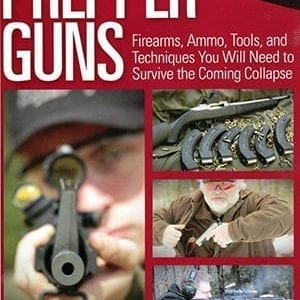I am just back from 12 days off the grid in Alaska. Well OK, I confess; I did have a Satellite phone. But other than that we were out of touch with the world and a long way away from any other people. My guide was a native of the area, at least in loose terms. We were an eight hour boat ride from his house with pretty much nothing but wilderness in between.
As we were hunting brown bear, which requires hours and hours of glassing with binoculars, we had plenty of time to talk. Like a lot of us he is very worried about the direction the country and the world are taking. He is not exactly a hard core pepper, but then again, he doesn’t have to be. This is a guy who already lives way off the grid. He is on an island that is only accessible by airplane or boat, in a location that is that requires another boat after you reach the island.
Power is from a generator. He grows, catches, traps and shoots most of the food his family eats. They heat with firewood that he cuts, raises some livestock, has a garden and a few natural hay meadows that he harvests. He is a mechanic, carpenter, a hunter and a gun guy. He reloads and is a decent gunsmith. He is already living the life that most preppers are preparing for, so calling him a “prepper” is a bit after the fact.
“I am in the best place possible if the crash happens,” he said.
But I am not so sure.
Then again, I am not sure he is not.
It’s something to think about.
In my novel the 14Th Reinstated I think I portrayed a pretty realistic scenario of what will happen if there is an economic and social crash. Think about the modern American city. Most if not all of the people there are complexly dependent on the system. They buy their food from the markets as they need it, or eat in restaurants. They get their water from the tap and expect their sewage to be taken away by the city run system. They expect to be protected from bad people by the police and the rules of society, so most haven’t a clue how to defend themselves and their loved ones. When trouble happens they expect the police, the paramedics or the fire department to deal with it. They have no concept of self-reliance.
More than a lot of them depend on the government for everything they need. Food stamp recipients are at an all-time high. The number of Americans on disability is nearly 11 million, another record, and households receiving government assistance is the highest it has ever been. Sure, some of that is earned and paid for; we have a reasonable expectation of a return from Social Security, Medicare and the other “non-voluntary” programs that we have been forced to pay into. But it’s still “depending on the government” and in the big cities that is exactly what the vast majority of the inhabitants are doing.
If the power goes off, the water stops flowing and the checks quit coming, there is going to be chaos. If the government shuts down so there are no police or fire protections it will be a huge disaster. Consider how it happened on a small scale in New Orleans after Katrina and, for the most part, the corrupt police caused more problems than they solved. In a crisis situation, I think you are better off to avoid the police. They will at the very least disarm you and leave you for the wolves. But, that’s a discussion for another time. For now, let’s just talk about the wolves.
The cities will fall apart very quickly. The store shelves will empty in hours or sooner. Once all those millions of people realize there is no government to hold their hands, they are going to panic. The smart people will be in hiding while the rioting, looting, robbing and killing is going on. But you can’t hide forever.
In the book, it turned to warfare as people started picking sides and the gangs ruled the city. The meanest, toughest people are going to take over and take what they want. You can’t hide from them forever and, unless you have stashed food and water, you will need to do something to survive sooner rather than later.
With the understanding that only pain, suffering and death is left for them in the city, the populations will flee. They will leave the murder and chaos of the urban areas with some vague hope that “heading for the hills” will save them.
They will follow the familiar travel corridors and so as they disperse from the urban areas most will gravitate to the interstate road systems. Now we have millions of hungry, desperate people looking for food and safety. God help you if you are in their path. If you have food and water you can expect to have a lot of people trying to take that away from you. If you are along the interstate corridors it will probably not end well. But, the further you are from the urban areas and the further off the beaten paths, the better your chances. That’s because fewer people will show up and they will likely be dispersed a little by then, so not so many will show up at any given time. It’s one thing to defend your home against a dozen or even a hundred people, but what will happen when 5,000 hungry and panicked souls show up to take your food? You will die, that’s what.
So where is the best place to be? I only wish I knew. Certainly my friend in Alaska is in the best spot for the first several months. But I think we all need three plans.
1: To survive the first 72 hours.
2: To survive the next six months.
3: If at the end of the six months the system is trashed and society has not reestablished control, then you need a plan to survive the rest of your life.
Off the grid, “can’t find me ever,” Alaska is the perfect place for the first two. But number three might be a problem. Most of us can’t live entirely off the land forever. Unless we want to make clothing out of dead animal skins, eat tree roots and hunt our food with a stone spear, we will need to depend on other people and some sort of a trade system. As things begin to settle down, a trade system will emerge, probably a barter system at first, just like in the book. We will need clothing, tools, food, medical supplies and so much more. That’s all going to be impossible to find if you are hundreds of miles in the wilderness and completely cut off from any road system. Or at least it won’t happen for a long time.
I am thinking that the best approach is to locate in a place that’s well away from urban areas and off the travel corridors, but not in total wilderness. You must be able to defend your place, because no matter how remote, they will find it sooner or later. But, if you can do that and make it through the first six months you should be in a good position to survive the rest of your life.
Of course we hope and pray that none of this ever happens. Odd are it won’t. So, if it doesn’t, what’s the downside of being ready? That you will be living in a peaceful, rural location that’s the kind of place every city dweller swears they will retire to someday?
What could possibly be wrong with that?








